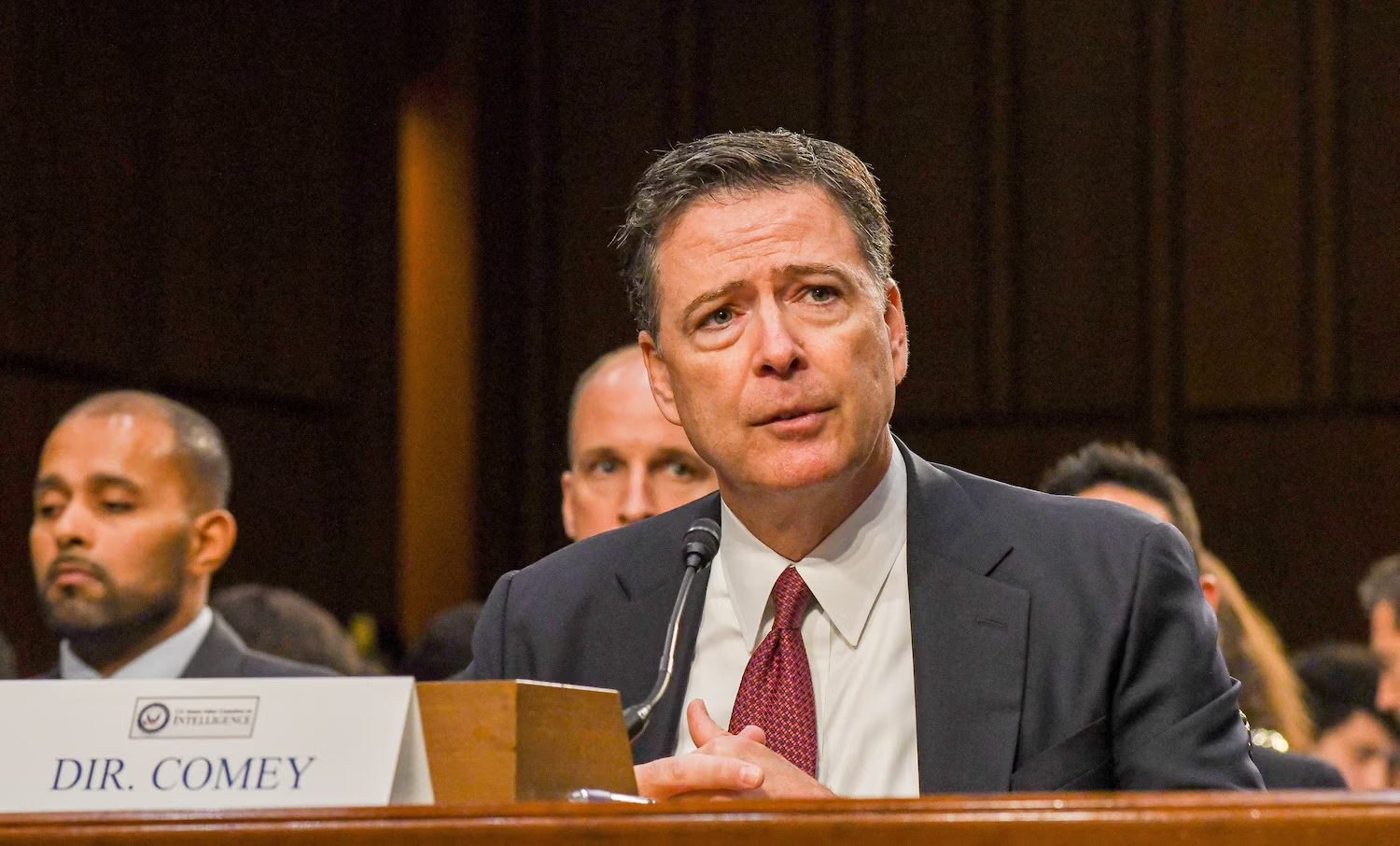The criminal case against former FBI Director James Comey advanced this week after the Justice Department released newly unsealed emails that prosecutors say shed additional light on Comey’s decision-making during the chaotic final weeks of the 2016 presidential election. Comey — who is fighting federal charges alleging he misled and obstructed Congress — maintains he is innocent and argues the case is politically motivated.
The newly disclosed material includes private communications Comey sent to his longtime friend and adviser Daniel Richman, offering a rare window into Comey’s mindset as the bureau revisited the Hillary Clinton email investigation shortly before Election Day.
Comey Expressed Anxiety Over Notifying Congress in 2016
One of the newly revealed emails shows Comey telling Richman, “I hate having to do it,” referring to his October 2016 decision to inform Congress that the FBI had discovered additional Clinton emails on a laptop belonging to former Democratic congressman Anthony Weiner. The message, now public through a recent court filing, provides context to Comey’s internal debate as the Clinton inquiry suddenly resurfaced.
The comments reflect Comey’s own discomfort with reopening the politically explosive issue just days before the election — a decision that became one of the most controversial moments of his tenure.
Court filings show Comey expected Hillary Clinton to win the 2016 election, referring to her in a message as “president-elect Clinton,” according to the documents.
Prosecutors Say Comey’s Actions Contradict Later Testimony
Comey is charged with allegedly misleading and obstructing Congress by denying that he authorized or encouraged media disclosures related to FBI matters. Prosecutors claim the newly released emails support their allegation that Comey was not fully candid when questioned about his contacts with the press.
The Justice Department’s filing asserts that incoming evidence shows Comey “appears to have coordinated” with Richman on press coverage related to the Clinton investigation — behavior prosecutors allege contradicts Comey’s later congressional testimony. Comey has pleaded not guilty.
Prosecutors also say the private communications reveal Comey used a personal, anonymous Gmail account to discuss certain FBI matters with Richman, a detail critics argue undercuts Comey’s past criticism of Clinton’s handling of government communications.
The Richman Connection: A Central Element
Daniel Richman, a Columbia University law professor and former Justice Department official, has long been known as a close Comey adviser. He also became widely known in 2017 after telling reporters he was the individual Comey instructed to share memos with The New York Times following his dismissal by President Donald Trump.
The newly disclosed documents indicate Richman was also in contact with reporters during the 2016 campaign while informally assisting the FBI, something prosecutors argue was done with Comey’s awareness.
Comey’s legal team rejects this interpretation, saying his communications were lawful and that the prosecution is attempting to paint routine interactions as misconduct.
Strzok Knew About Laptop Emails Weeks Earlier, Records Say
The court records also reference FBI leadership’s awareness of the newly discovered Clinton emails before Comey’s October 2016 announcement. Former FBI special agent Peter Strzok reportedly knew about the emails on Weiner’s laptop in September 2016, according to the filings.
This detail is already known within the broader historical timeline of the Clinton investigation, but the new filing emphasizes that the discovery was not a sudden revelation for FBI leadership.
Comey’s Defense Claims Lack of Clarity in the Indictment
In a filing submitted last month, Comey’s attorney, Jessica Carmichael, argued that the current indictment fails to provide the specificity needed for Comey to prepare his defense. She requested that the court order prosecutors to produce a “bill of particulars” clarifying exactly how Comey allegedly misled Congress and what specific conduct prosecutors intend to prove.
Carmichael wrote that “the indictment in its current form does neither” provide clarity nor allow Comey to adequately prepare.
Government Pushes Back: ‘Not a Discovery Device’
Acting U.S. Attorney Lindsey Halligan pushed back forcefully this week in a new government filing, arguing that Comey is improperly seeking advance disclosure of the prosecution’s trial strategy.
“A bill of particulars is not to be utilized as a discovery device,” Halligan wrote, adding that the indictment already supplies “the essential facts constituting the offenses.”
Halligan argued that the government is not required to preview its evidence, legal theories, or “the precise manner in which the Government intends to prove the charges.”
DOJ Filing Claims Coordination With Richman Increased Immediately After 2016 Letter
The Justice Department’s latest filing also asserts that Comey’s alleged coordination with Richman intensified immediately after Comey notified Congress of the newly discovered Clinton emails on October 28, 2016.
“Almost immediately after sending the above-described letter,” prosecutors wrote, “the defendant appears to have begun coordinating with Daniel Richman … to respond to resulting media coverage.”
The filing states that Comey was already discussing media strategy with Richman on the same day the letter was delivered to Capitol Hill.
Prosecutors argue that this contradicts Comey’s later statements suggesting he did not authorize or participate in press outreach related to the investigation.
Comey Says Case Is Politically Motivated
For his part, Comey maintains that he has done nothing wrong. Through his counsel, he argues that the charges are “politically driven,” referencing the broader conflict between Comey and former President Trump, who fired him in 2017.
Observers expect Comey’s legal team to continue pressing for dismissal ahead of trial, citing constitutional concerns and what they characterize as prosecutorial overreach.
What Happens Next
The new filings are part of an ongoing back-and-forth as both sides prepare for trial. The court has not yet ruled on Comey’s request for a bill of particulars or on any motions to dismiss the indictment.
More filings and disclosures are expected in the coming weeks, and prosecutors have indicated that additional previously unseen communications may be introduced as part of their argument.
The developments underscore how the 2016 election — now nearly a decade behind the nation — continues to shape legal battles, political narratives, and institutional scrutiny.
For now, the newly released emails add another layer to an already contentious case — one that remains deeply intertwined with one of the most politically fraught periods in modern American history.

Emily Johnson is a critically acclaimed essayist and novelist known for her thought-provoking works centered on feminism, women’s rights, and modern relationships. Born and raised in Portland, Oregon, Emily grew up with a deep love of books, often spending her afternoons at her local library. She went on to study literature and gender studies at UCLA, where she became deeply involved in activism and began publishing essays in campus journals. Her debut essay collection, Voices Unbound, struck a chord with readers nationwide for its fearless exploration of gender dynamics, identity, and the challenges faced by women in contemporary society. Emily later transitioned into fiction, writing novels that balance compelling storytelling with social commentary. Her protagonists are often strong, multidimensional women navigating love, ambition, and the struggles of everyday life, making her a favorite among readers who crave authentic, relatable narratives. Critics praise her ability to merge personal intimacy with universal themes. Off the page, Emily is an advocate for women in publishing, leading workshops that encourage young female writers to embrace their voices. She lives in Seattle with her partner and two rescue cats, where she continues to write, teach, and inspire a new generation of storytellers.









